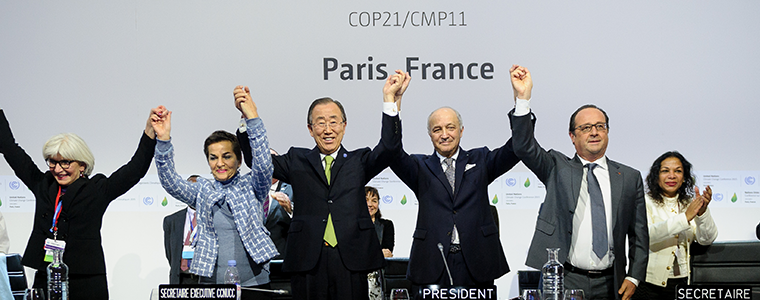The Paris Agreement is expected to come into force from 2020 (and will replace the Kyoto Protocol). I would like to highlight seven key points that you may not know about, and that could help for better understanding of the agreement:
- The 2°C Goal
The agreement sets an ambitious goal of holding global warming to “well below 2°C” and pursuing efforts to limit the temperature increase to 1.5° C above pre-industrial levels. To achieve this long-term target, countries are to peak their greenhouse gas (GHG) emissions “as soon as possible” and then undertake reductions thereafter to achieve a balance between emissions and removals by sinks of GHG in the second half of this century. In other words, the agreement establishes that from 2050 onwards countries are to have net-zero emissions as soon possible and for that they will rely on carbon sinks (like forests) to offset any emissions they produce.
- NDCs
The Paris Agreement establishes a ‘bottom up’ approach as opposed to a ‘top down’ one, where standards and targets are set internationally for states to implement. NDCs are high-level policy plans or pledges showing how countries will reduce emissions and contribute to the 2°C goal.
NDCs are to be revised every five years (the first one is expected in 2025) in order to see how their level of ambition could be enhanced.
- Mitigation and Carbon Markets
The deal allows the use of markets to allow countries collaborate with each other through “internationally transferred mitigation outcomes” (ITMOs) to fulfill their NDCs commitments (provided there is no double counting of emissions reductions). The way ITMOS will operate in practice will be clarified in the future by the Parties of the Agreement (a body to be known as the CMA).
- Adaptation and loss and damage
Under the agreement, countries are to implement national adaptation planning processes and activities which includes assessing their vulnerability and building resilience. Small island states, which are particularly vulnerable to climate change, pushed for including the responsibility of developed countries for loss and damage suffered from climate change consequences. The agreement included a reference on this issue but did not create any legal liability or rights to compensation.
- REDD+
While avoided deforestation has been controversial and generally been excluded in the UN climate change policy arena, the Paris Agreement included an explicit provision on REDD+, which represents a breakthrough on how forests were addressed in the past. Parties to the agreement are encouraged to implement and support activities related to REDD+ and “alternative policy approaches (…) for the integral and sustainable management of forests”.
- Climate Finance
Developed countries shall provide financial resources to assist developing countries for mitigation and adaptation activities. Other ´wealthier developing countries´ are called to provide resources but on a voluntary basis. The Paris Decision sets a floor of USD 100 billion per annum to be mobilized each year after 2025. Nevertheless, the agreement does not include any binding new or specific figures.
- TT and Capacity Building
The deal calls for technology transfer, capacity building and mutual cooperation to improve climate change resilience and reduce GHG emissions.
titulo: Séance pleinière de la COP21 pour l’adoption de l’accord de Paris
foto: © Copyright CC0 1.0 Universal – COP PARIS


Pamela boa tarde, gostaria de um contato mais estreito com você!! motivo tenho muitas áreas de florestas aqui no brasil agregado na minha empresa para desenvolver os projetos de sustentabilidade ambiental para a salvaguarda da biodiversidade de governança florestal para a metodologia (REDD+) projetos estes de carbono florestal, temos projetos para desenvolver nas áreas indígenas e áreas privadas,..porem precisamos de financiamentos para desenvolver esses projetos,..gostaria de um apoio da governança do BID….sem mais para o momento muito obrigado pela atenção… CEO, José da silva da MDSCARBON CORPORATION DE BIODIVERSIDADE LTDA….